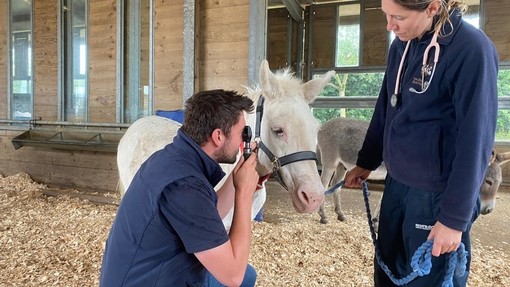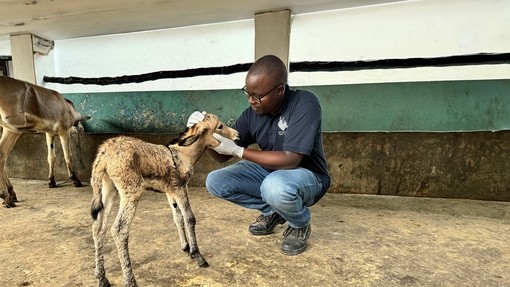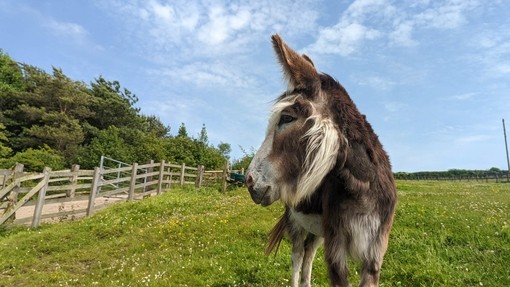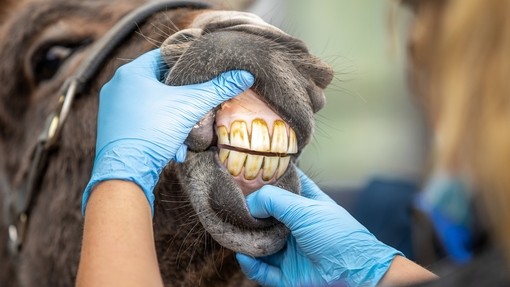
Page section Heading
Katie Read is now one of our fully qualified Equine Dental Technicians after passing the British Equine Veterinary Association (BEVA) exams at the end of 2020. She is also a full member of the British Association of Equine Dental Technicians (BAEDT).
Katie’s love of equines started when she was 12 years old and owned her first horse, Boris. Sadly, Boris was suffering with nasal discharge, and Katie was shocked to hear the vet’s diagnosis – it was issues with his teeth causing the nasal symptoms. This was the start of her fascination with equine dentistry.
Katie joined The Donkey Sanctuary in 2012, working as a groom in our New Arrivals Unit at Strete Farm, in East Devon.
All donkeys who come into our care go through New Arrivals. During their stay here, they are given a full health check, which includes a thorough examination of their teeth.
It was here in New Arrivals that she fell in love with donkeys, and began working with Dental Technician Lee Gosden.
In 2018, Katie became a full-time Dental Trainee, working alongside Lee and attending Continuing Professional Developments run by the BAEDT and BEVA.
Katie said: “Watching Lee really inspired me, and my colleague Gemma Lilly, a former Equine Dental Technician at The Donkey Sanctuary, was instrumental in helping me prepare for my exam. Although it was challenging, and I dropped my full-time position to work part-time in my role as a groom and used nearly all my holiday doing dentistry, it was worth every minute.
“It is so rewarding to be able to help improve the welfare of these amazing, calm and emotionally intelligent animals. Good dentistry can have a huge impact on a donkey’s health and significantly improve its life span. It can mean a big reduction in colic caused by impacted teeth, for example, as well as lowering associated disease within the charity’s resident herd.”
It was training with our expert behaviourist, Ben Hart, that helped Katie understand how donkeys are really special but need careful handling.
Katie explained: “Donkeys have an excellent memory and great ability to learn. But this means they remember good and bad experiences for a long time, and negative events can affect a donkey’s behaviour for years afterwards. You need to be patient and relaxed, learn to read their behaviour, and then you can work well with donkeys.”
With hundreds of donkeys in our care, Katie has found working with varied and complex cases hugely rewarding. From following up on dental cases from a farm referral, taking radiographs at our specially designed veterinary hospital near Honiton, to helping create treatment plans for post-care.
Katie recently worked with a 24-year-old gelding called Big Ears, who has had regular dental treatments due to a number of issues that are being carefully managed.
Big Ears has had fractured teeth and has had extractions in the past, which means the teeth opposing his absent ones over erupt into the spaces and need reducing. He also has displaced teeth, which require remedial work to alleviate any pain and reduce the chance of developing dental disease.
Big Ears recently suffered from a nasal discharge. Discharge from one nostril is a good indication it is from dental pathology, although swabs taken by the vet had indicated there was no infectious disease.
Katie said: “I examined the donkey and discovered that where one of his upper molars is absent, the one behind has drifted into the gap (called mesial drift). We then took X-rays which showed a halo was apparent at the roots of the drifted tooth, indicating disease and the reason for the sinusitis.
“He has now had the tooth extracted and will be under great care during his recovery, and he will feel so much better for it too!”
Today Katie is so proud to have finally realised her equine dentistry dream and to have met the tough standards required by BEVA. “I love my job and am thrilled to have the freedom to work on my own now with the amazing herd at The Donkey Sanctuary, which is like my second home!”
Share this page
Tags
- Blog







